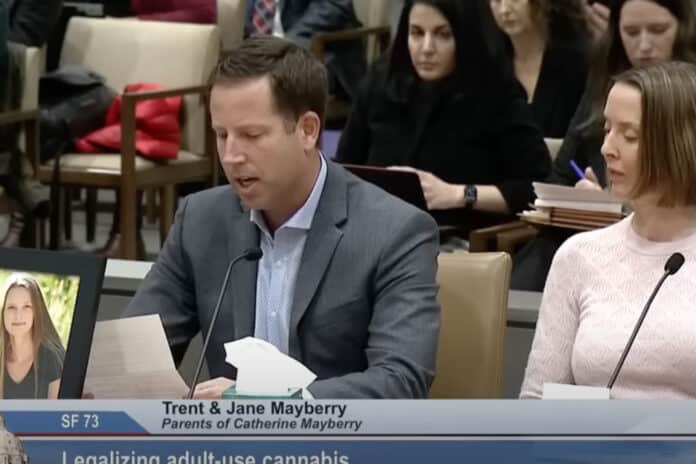
Trent and Jane Mayberry told a panel of Minnesota lawmakers last month that cannabis “destroyed” their daughter’s life.
“Catherine was a perfect kid up until age 18 — social, smart, athletic, creative, and hardworking,” they told the Senate Health and Human Services Committee during a Feb. 21 hearing, one of several committee stops for a bill to legalize recreational marijuana use for those 21 and up in the state of Minnesota.
The Mayberrys said their daughter was never the same after she left for college at the University of Minnesota in 2016.

“Over a two-year period, Catherine began regular use of cannabis. She dropped out of college. Her personality changed and she became increasingly withdrawn from activities, university, friends and family. She was addicted to cannabis. She then experienced her first episode of psychosis in the fall of 2018 at the age of 20,” they said in their testimony.
According to the Hazelden Betty Ford Foundation, a world-renowned addiction treatment center based in Minnesota, young people who use cannabis are at “increased risk of developing schizophrenia, which is a chronic and debilitating degenerative disease of the brain.”
Both Hazelden and the Minnesota Society of Child and Adolescent Psychiatry (MSCAP) think the bill should have more guardrails to protect youth, such as potency limits, more robust warning labels, and raising the minimum age to 25, which is when the brain is fully developed.
MSCAP said cannabis use can result in “long-term psychosis,” depression, and anxiety.
The Mayberrys experienced this firsthand.
“Catherine’s brain was permanently damaged from cannabis use. She was in a catatonic state and was admitted to the mental health in-patient facilities at Fairview Riverside and later Regions Hospital. From this point forward, Catherine suffered from continuous auditory hallucinations, delusional thinking, slowed mental capacity, and extreme anxiety. The anti-psychotic drugs prescribed by her care team did not help. We later found out this is because they are not effective at treating cannabis-induced psychosis,” they told lawmakers.
The Mayberrys said they refer to this stage in Catherine’s life as her “first death.”

“Over the next four years, Catherine changed her name to Cat. She lost all her friends. Her prospects for college and career were gone. She lived in 24-hour staffed subsidized housing and even menial work was too much for her given her condition. Yet she continued to seek out and use cannabis. The anti-psychotics didn’t work so she turned to self-medicating with hard alcohol and increasingly harder drugs,” they said.
In October 2022, Catherine died of an accidental overdose from meth laced with fentanyl at the age of 24.
“My wife and I saw firsthand how cannabis destroyed our daughter’s life,” Mr. Mayberry said. “There is no doubt in my mind that this bill in its current form will harm Minnesota families and especially kids and young adults under the age of 25.”












